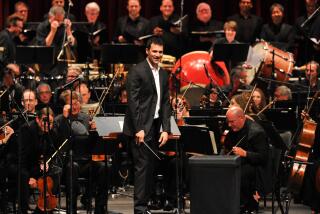Digital Electronics Makers Will Pay Royalties : Recordings: The agreement on payments to the music industry opens the way for new home digital technologies for consumers.
In a landmark accord that should open the floodgates to a wave of new music-recording technologies, electronics manufacturers have agreed to pay royalties to the music industry on the sale of all digital home-recording equipment.
The agreement, which will be formally announced today and requires congressional approval, will end a battle that began four years ago with the advent of digital audiotape (DAT) technology.
By using the ones and zeros of computer code to record music, DAT provides not only compact-disc-quality sound on a tape, but also allows anyone to make perfect copies from CDs or from other digital tapes. Two competing digital formats that are scheduled to be rolled out next year--Philips’ Digital Compact Cassette (DCC) and Sony’s Mini Disc--have similar attributes.
Record companies, music publishers and recording artists--fearful that high-quality taping would cut into sales of recorded music--have fought a largely successful battle to block the acceptance of DAT and threatened to do the same with DCC and Mini Disc.
Industry sources said it had finally become clear to consumer electronics manufacturers--desperate for a hot product such as the compact disc or videocassette recorder--that digital recording technology would never take off unless a deal was cut with the music business.
Although a handful of Japanese electronics companies, led by Sony, began selling DAT machines in the United States last year, a lawsuit against Sony by the National Music Publishers’ Assn. and the absence of prerecorded DAT music has dampened sales and kept prices high.
The NMPA’s class-action lawsuit, which alleged that Sony was illegally facilitating copyright infringement, was dropped Wednesday as part of the agreement.
According to sources involved in the negotiations, the agreement--initially disclosed in the trade newsletter Audio Week--calls for electronics vendors to pay a royalty of 2% on the wholesale price of any digital recording machine, with a minimum of $1 and a maximum of $8 for each unit. Most DAT machines now sell for about $800 retail, but prices for all three digital recording formats are expected to be dramatically lower within several years.
A royalty of 3% will also be paid on the wholesale price of blank tapes and discs. One-third of the royalty payments will go to music publishers and songwriters, and two-thirds will go to record companies, which in turn will distribute some of the money to recording artists and their unions.
Consumer electronics vendors have vehemently opposed royalty payments on either audio or video recording equipment, and succeeded in 1984 in beating back a legal challenge from the film industry over videocassette recorders. Consumer groups have also opposed royalties because they raise prices.
It appeared that a compromise on DAT was in hand last year when the electronics vendors agreed to incorporate special technology into their machines that would have permitted copies, but made it impossible to produce copies of the copies. But the music publishers refused to go along.
The anti-copying technology is also part of the compromise agreement. Hilary Rosen, executive vice president of the Recording Industry Assn. of America, said the compromise package would be introduced in Congress within the next several weeks.
“Nothing sails through Congress,” she said, but added: “We are not aware of any organized opposition.” A spokeswoman for Consumers Union, publisher of Consumer Reports magazine, said that although the group opposes the royalties in principle, it would not fight the compromise agreement.
The proposed legislation also includes specific language making home taping for personal use legal.
“Everybody wins in this,” said Paul Gluckman, managing editor of Audio Week. “Hardware companies and consumers get what they should get: new technology unencumbered by legal clouds.”
Ironically, however, the deal appears to have come too late to save the DAT system as a mass-market technology. Unlike DAT machines, Digital Compact Cassette recorders will also be able to play traditional analog tapes, and the Mini Disc has advantages in size and convenience. DAT offers somewhat better sound and is expected to survive as a high-end professional format.
DCC, invented by Philips, is strongly backed by Tandy Corp., and Tandy Chairman John Roach played a key role in brokering the compromise with the music industry, according to several sources.
Al Teller, chairman of MCA Music Entertainment Group, said software manufacturers “feel extremely good” about the agreement, which he called a “watershed.”
“It’s a significant recognition of the bedrock importance of intellectual copyrights,” he said.
Officials at Sony and the Electronics Industries Assn. declined to comment in advance of the announcement today.
Times staff writer Alan Citron contributed to this story.
More to Read
The biggest entertainment stories
Get our big stories about Hollywood, film, television, music, arts, culture and more right in your inbox as soon as they publish.
You may occasionally receive promotional content from the Los Angeles Times.









